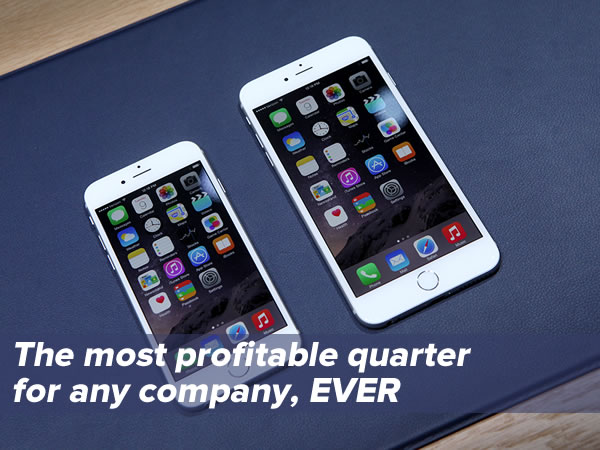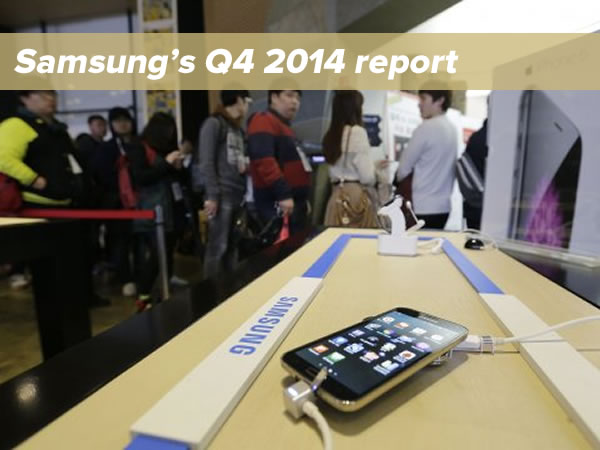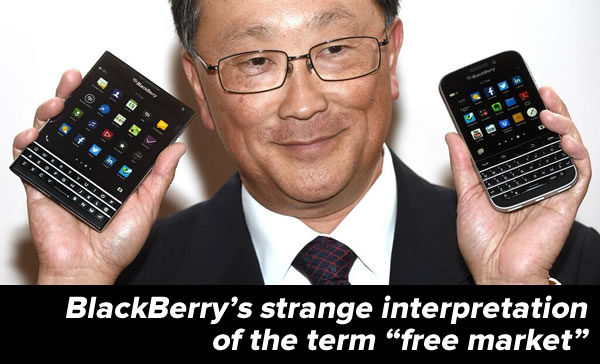Apple’s astonishing quarter

Yesterday, which also happened to be the fifth anniversary of Steve Jobs’ iPad announcement…
…Apple posted the financial results for their fiscal first quarter of 2015, in which they made a net profit of $18 billion. That’s not just a record for Apple, but for any company, any time in human history. The previous record-holder was the Russian firm Gazprom, the world’s largest extractor of natural gas.
The insanely popular iPhone 6 and 6 Plus carried the company, who sold nearly 75 million iPhones (in previous quarters, they had yet to surpass the 60 million mark, never mind 70 million), a 46% increase from the same quarter in the preceding year. “Greater China” — Apple’s term for the area comprising mainland China, Hong Kong, and Taiwan — helped push Apple over the top. They accounted for $16 billion of the nearly $75 billion revenue for Q1 2015.
This success in China comes at a cost to Samsung, whose market share in the Middle Kingdom is dropping. There’s a good summary of this situation in Bloomberg Business’ article, Apple Learns What Samsung Forgot: How to Sell Phones in China.
If there’s a cloud in all this silver lining, it’s iPad sales, which dropped to 21.4 million, a decrease of 21% year over year. In Wired’s article, How the iPad Went From Massive to ‘Meh’ in 5 Short Years, it’s noted that the iPad lives in that zone between smartphone and laptop, a gap that’s being closed by larger phones and thinner, lighter laptops.
Samsung: Speaking of earnings reports…

Samsung will release its 4Q 2014 earnings report on Thursday morning in Seoul (in the UTC+0900 time zone, 14 hours ahead of North America’s Eastern Time), before markets open. According to the Wall Street Journal, here’s what we should expect:
- Net profit: 4.5 trillion won ($4.2 billion)
- Revenue: 52 trillion won ($48.3 billion)
- Mobile: operating profit down 65% from the same time during the previous year, shipped 10 million fewer units as well
- Chips: a 40% rise in profit, and increased production of mobile processors for both their devices and Apple’s
BlackBerry’s modest proposal

In a recent post on BlackBerry’s blog, CEO John Chen talks about net neutrality and carrier neutrality, and what he says sounds sane and sensible. He then follows with application/content neutrality, and that’s where things get a little weird:
Unlike BlackBerry, which allows iPhone users to download and use our BBM service, Apple does not allow BlackBerry or Android users to download Apple’s iMessage messaging service. Netflix, which has forcefully advocated for carrier neutrality, has discriminated against BlackBerry customers by refusing to make its streaming movie service available to them. Many other applications providers similarly offer service only to iPhone and Android users. This dynamic has created a two-tiered wireless broadband ecosystem, in which iPhone and Android users are able to access far more content and applications than customers using devices running other operating systems. These are precisely the sort of discriminatory practices that neutrality advocates have criticized at the carrier level.
Therefore, neutrality must be mandated at the application and content layer if we truly want a free, open and non-discriminatory internet. All wireless broadband customers must have the ability to access any lawful applications and content they choose, and applications/content providers must be prohibited from discriminating based on the customer’s mobile operating system.
In other words, “Developers and online services like Netflix should be mandated by law to build BlackBerry apps,” apparently forgetting that in better BlackBerry-dominated times, BBM was a BlackBerry-only service and a competitive advantage.
On some level, Chen’s position is understandable. The point of net neutrality is to encourage innovation in online services, and to prevent Internet providers from picking winners and losers. Chen is saying that BlackBerry hasn’t been given a fair shot because app makers have declared iOS and Android victorious.
But there’s a critical difference between net neutrality and the app neutrality that Chen proposes: With net neutrality, non-discrimination is the default. The Internet stops being neutral only if Internet providers create new, discriminatory practices such as blocking, throttling and fast lanes. The point of net neutrality rules is to maintain the Internet in its non-discriminatory state.
With Chen’s proposal of app neutrality, no such non-discriminatory state exists. Each new platform merely creates more work for developers, thereby requiring greater investment. Under Chen’s proposal, the barriers to entry for a small startup would become greater, and innovation would be stifled. App neutrality may be beneficial for BlackBerry, but it would actually counteract the things that net neutrality is trying to achieve.
Our guess is that Chen added “app neutrality” to his article on net neutrality as a way to attract more attention to it, generate discussion, and keep BlackBerry on people’s minds. Well played, sir.
At least it’s not as bad as tweeting BlackBerry promotional messages from an iPhone…
